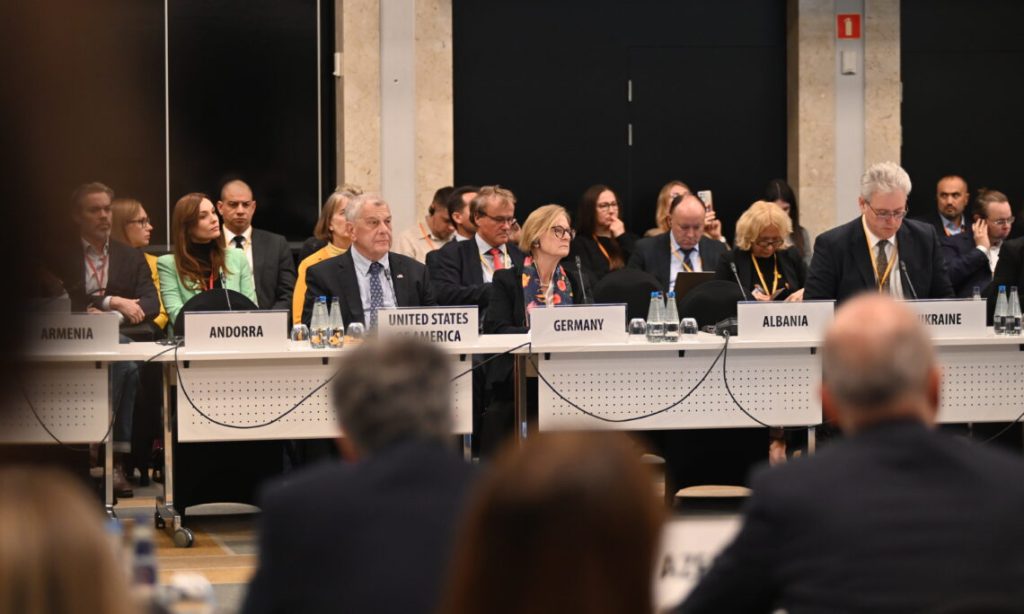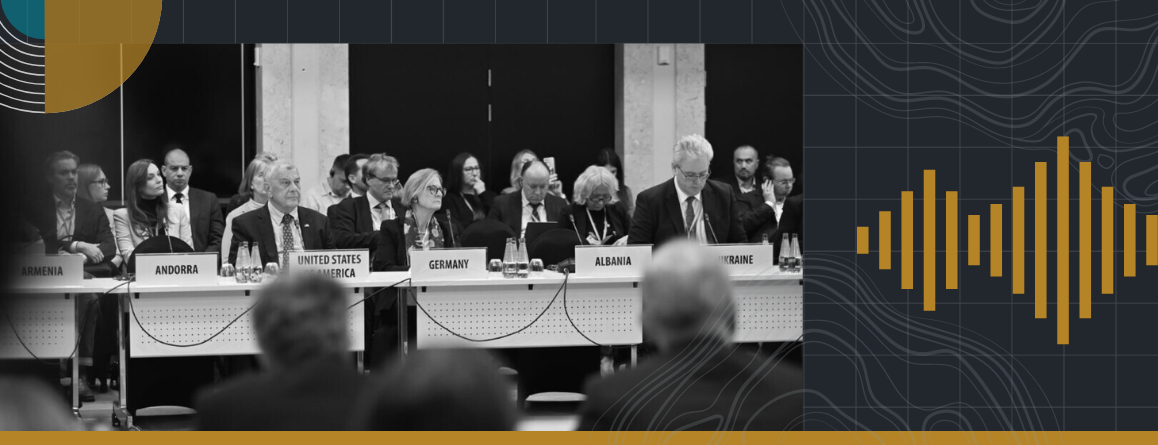
Ambassador Michael G. Kozak, Head of the United States Delegation at the WHDC. Credit: U.S. Mission to the OSCE
Warsaw, October 11, 2024
On behalf of the Delegation of the United States, I wish to express sincere appreciation to the Maltese Chairpersonship for its leadership in convening this conference, and to ODIHR for organizing it. As long as Russia continues to obstruct the annual Human Dimension Implementation Meeting, holding the Warsaw Human Dimension Conference remains imperative.
Once again, all but a handful of participating States and a record number of civil society representatives from across the OSCE region made the WHDC a success. I found their interventions and side events to be first class and usefully focused on practical outcomes. Together, we demonstrated our resolve to hold governments responsible for implementing the OSCE commitments they have made and to spotlight instances where they have not.
Once again, Russia and its enabler the Lukashenka regime in Belarus chose not to attend. Their empty chairs are an admission that the atrocities and abuses they have committed have no credible defense. But we did not meet their absence with silence. For the past two weeks, this hall has resounded with government and civil society voices from across the OSCE region condemning their actions in violation of international law and in contravention of the Helsinki Final Act.
For more than a decade, we have documented Russia’s deepening authoritarianism. It has only accelerated since the Kremlin launched its full-scale war against Ukraine. Our discussions here have made abundantly clear the direct connection between the contempt Putin shows for his own people through his domestic crackdown and the contempt he shows for the sovereignty and territorial integrity of other states.
Russia holds more political prisoners than most countries in the world. But its puppet, Belarus, a country with one-fifteenth the population of Russia, holds even more.
President Lukashenka, many of these people are ill – like Maria Kalesnikava and Ales Bialiatski. They pose no threat to you or anyone else. Please ask your authorities to let them go home to their families.
Another major area of concern raised at this conference is the proliferation of restrictive laws, similar to Russia’s, that have been adopted or are contemplated by other countries in the OSCE region. Whether they are so-called “foreign agents” laws, “sovereignty protection” measures, “anti-LGBT” legislation or vague “anti-extremism” statutes, they have one thing in common: their aim is to justify state control over freedom of expression. If you don’t have freedom of expression, you won’t be able to exercise other fundamental freedoms of assembly, association, and religion or belief.
Particular individuals or groups may be the immediate targets of such laws. But eventually these laws will be used against an ever-widening circle of people. By intent and effect, these measures chill peaceful dissent, straitjacket civil society, and censor the media.
Authoritarians do not become dictators simply because they hate Jews, or Roma, or LGBTQI+ persons, or some other minority group. They stoke hatred against particular minorities as a way to gain and keep power over the entire society.
Racism, xenophobia, religious and other forms of intolerance – particularly when fanned by irresponsible state officials and public figures – divide societies. They endanger not only the targeted communities but also broader security.
The Human Dimension that occupies us here in Warsaw is intertwined with the other dimensions of security – the economic/environmental and the political/military dimensions. For example: a court in the Kyrgyz Republic unjustly convicted independent Temirov Live journalists yesterday on spurious charges of “inciting unrest” simply for exposing corruption. Countering corruption is an economic dimension priority. Irresponsible environmental practices, abetted by corruption, have had a devastating effect on the Indigenous peoples of Siberia. This illustrates the interrelationship between the Human and Economic/Environmental dimensions. The Kremlin’s war kills Ukrainian civilians. But it also damages grain silos and ports, exacerbating global food insecurity. Releasing any remaining detainees and sharing information on those missing and victims of enforced disappearances are crucial to Armenia’s and Azerbaijan’s effort to reach a dignified and durable peace agreement.
The OSCE’s comprehensive concept of security could not be more relevant: respect for the inherent dignity and rights of all persons is inseparably linked to the achievement of lasting prosperity and security.
In closing, I’d like to highlight other important connections – the connections that we all have made with one another here in Warsaw. The U.S. delegation sees WHDCs, like HDIMs, as valuable venues for NGOs and human rights defenders to share their expertise directly with participating States and OSCE institutions. Your ideas for how the OSCE can best use its diplomatic engagements, mechanisms, and programs to support needed reforms, or gain the release of political prisoners, inform our work in Vienna and in the field. Your presence here and compelling first-hand accounts reinforce our resolve to ensure the OSCE continues to have principled leadership and do meaningful work across this vast region.
We are acutely aware that many of the NGOs and human rights defenders who have participated in this conference did so despite the risk of retaliation against yourselves and your families back home. Such retribution is a blatant case of transnational repression. Sadly, we have witnessed verbal attacks against a number of NGOs made by GONGOs and government delegations during the conference sessions. NGOs have been accused of crimes and in some cases their personal information has been given out. In other cases, GONGOs have filmed NGOs in side-events without their permission. This can be seen as a threat. Participants should not be threatened by other participants. GONGOs were handing out flyers in an apparent attempt to dissuade attendance at an NGO side-event.
To the many GONGOs who have participated in this conference and the governments that put you up to it, you are not fooling anyone.
And to the brave human rights activists who contributed immensely to these discussions: we hope that this conference has been worthy of the risks you took to be here. Please know that the United States will continue to champion the cause of human rights not just once a year at the WHDC but throughout the year.
We thank the government and people of Poland for their gracious hospitality.
